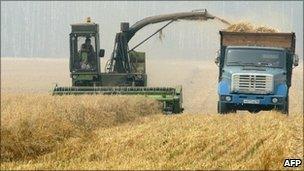Russia extends its grain export ban
- Published

This year's crop in Russia could be 40% lower than in 2009
Russia will consider lifting its grain export ban only after the next year's harvest has been reaped, Russian Prime Minister Vladimir Putin has said.
Mr Putin did not say when exactly the ban, originally introduced from 15 August to 31 December, would be lifted.
Global wheat prices have risen by 1.4% on Thursday, after gaining more than 3% during the previous session.
Russia, one of the world's biggest producers of wheat, barley and rye, was hit hard by a drought this summer.
The heatwave destroyed crops in many parts of the country, pushing food prices up.
Dependent on imports
Mr Putin said that the ban was extended to "provide stability and predictable conditions for all market participants".
Andrei Sizov, managing director at SovEcon agriculture consultancy, said: "What happened is what everyone expected."
Commerzbank said in a note: "The shortage of wheat in some traditional exporting countries - Russia will probably also be dependent on wheat imports - should lead to a further reduction in high US wheat stocks and therefore support prices."
In 2009, Russia exported a quarter of its annual grain output of 97 million tonnes.
This year's crop could be as low as 60 million tonnes, but Russia needs almost 80 million just to cover domestic consumption.
Other key grain producers have also reported shortages, which has led to rising wholesale prices and heightened fears about the impact on consumers.
There has been speculation that Ukraine, the world's largest exporter of barley and the sixth-biggest of wheat, may also cut back exports. But its government said last month there were no grounds to limit them.
Although world wheat stocks still remain above crisis levels seen in 2007-08, when a shortage sparked civil unrest in several countries, the problem is becoming more acute.
Mozambique on Thursday saw a second day of riots caused by soaring bread prices.
According to the Reuters news agency, on Wednesday seven people died when police opened fire on protesters in the capital Maputo.